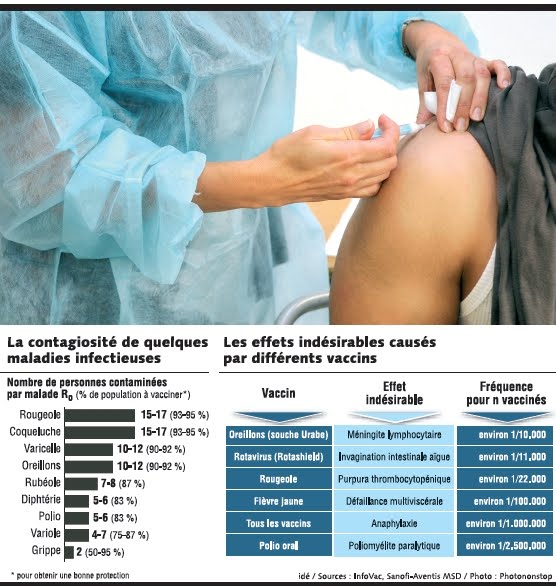After the fiasco of the vaccination campaign against "false pandemic" influenza caused by H1N1 virus, specialists in public health want to reconcile the French with the vaccine before the arrival of winter infections .
The disastrous campaign of vaccination against the H1N1 has only confirm and amplify a disturbing trend. "Dr. Robert Cohen, a pediatrician and coordinator of the network INFOVAC to hospital in Créteil, will resume his stick Pilgrim. Back to school and the inevitable return of seasonal influenza infections and winter are likely to revive debate on immunization.
GP and pediatricians will be on the front line in dealing with critics patients and parents who are sure to remind them of the serial episodes H1N1.
The Senate report on the "false pandemic" published in early August is very severe with the French government and the World Health Organization (WHO), accused of "group think that led to a substantial overestimation of risk." The document denounces pell-mell "excessive purchases", the "failure of general association" and "conflicts of interest among experts and industrialists."
GP and pediatricians will be on the front line in dealing with critics patients and parents who are sure to remind them of the serial episodes H1N1.
The Senate report on the "false pandemic" published in early August is very severe with the French government and the World Health Organization (WHO), accused of "group think that led to a substantial overestimation of risk." The document denounces pell-mell "excessive purchases", the "failure of general association" and "conflicts of interest among experts and industrialists."
Senators Alain Milon (UMP) and François Autain (Communist), authors of the report and both doctors, believe that policymakers have been blinded by the scenarios the worst "and influenced by vaccine manufacturers" in an oligopoly situation. " Industrialists have also benefited from the panic to transfer to the French state health responsibilities on any defective products. In France, 5.35 million people were immunized against H1N1 (8.23% of the population), against about 10% in Germany, 25% in the United States and nearly 65% in Sweden. The campaign has resulted in worldwide sales of vaccines estimated between 5 and 6 billion.
drop in confidence
Another survey prepared by the Parliamentary Assembly of Council of Europe is equally critical of the institutions. According to the rapporteur of the mission, Britain's Paul Flynn (Socialist), "serious deficiencies were identified regarding the transparency of decision-making process." This document is also concerned about a "drop in reliance on advice given by public health agencies." A justified fear: almost 40% of French believe that the H1N1 vaccine was "not sure". Result This ac cumulation of blunders: the vicissitudes of political health H1N1, according to Robert Cohen, a bad blow to the "backbone of the fight against infectious diseases."
Abiker David, a columnist at the time on France Info, has followed the case by analyzing the buzz on the Internet. "This crisis marks the rout experts. The French rejected the official communication and the precautionary principle applied to the square, "says this observer in the galaxy of the Web, for whom the Internet" gives a bonus to derision and rumor. " According to Jacques Attali also interested observer of events, it is further proof of "loss of confidence in the elites of a society increasingly individualistic." These reactions disturb the confidence of public health specialist Yves Charpak, "Fighting against an invading virus is a collective war. Not to vaccinate is a selfish behavior. "
is in this context that the missionaries of Health will have to speak again before the arrival of the first frost. A more difficult exercise that vaccination has three features that blur its image: it is aimed at bienportants, protection is imperfect and it causes side effects. "It's a completely different biologic drug. Its effectiveness varies depending on the disease and patients. This uncertainty is difficult to manage, "admits Dr. Benoît Soubeyrand, medical director of Sanofi Pasteur MSD.
In fact, the act provides a dual vaccine prevention: it protects individual (I make my immune system a threat) and is a shield collective (in protecting me, I preserve my surroundings). The trouble is that this beautiful logic, which combines individualism and altruism, does not work every time. We must introduce a few statistics to understand the strategy of epidemiologists.
On the same subject
An exponential progression - Effect herd
An infectious agent (virus, bacterium or parasite) is characterized by its virulence and contagiousness. A child ill with measles or pertussis infects an average of fifteen people around him, about two cons if infected with influenza virus. But the effectiveness of a vaccine never reaches 100%. The best (measles) are close to 95%, while the worst (flu) in some years down to 60%. Control an epidemic therefore requires a military-style response: the more a disease is contagious and must vaccinate large populations quickly to cut the road to the pathogen. "This is for the herd effect," says Robert Cohen.
side effects are another weak point of the process. They are still very poorly supported by the public who accepts it difficult to run a risk with preventive therapy. Moreover, the perceived risk often has nothing to do with the actual risk. According to a Finnish study of 581 pairs of twins, the majority of problems are not modified varicella side reactions, but intercurrent events (temporally related to vaccination, but no causal relationship). But the cliches and superstitions die hard and no one likes bad news. Whoever breaks his leg the day after a vaccination will be tried link the two events and attribute his misfortune to the heirs of Pasteur. However, if he wins the lottery, he will put this on account of his good fortune.
Alain Perez, Les Echos

0 comments:
Post a Comment